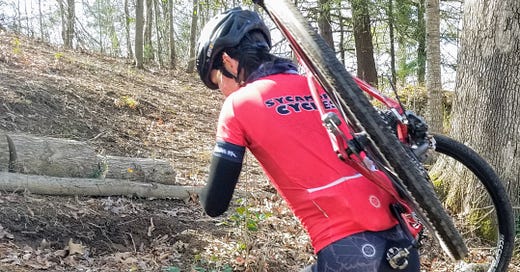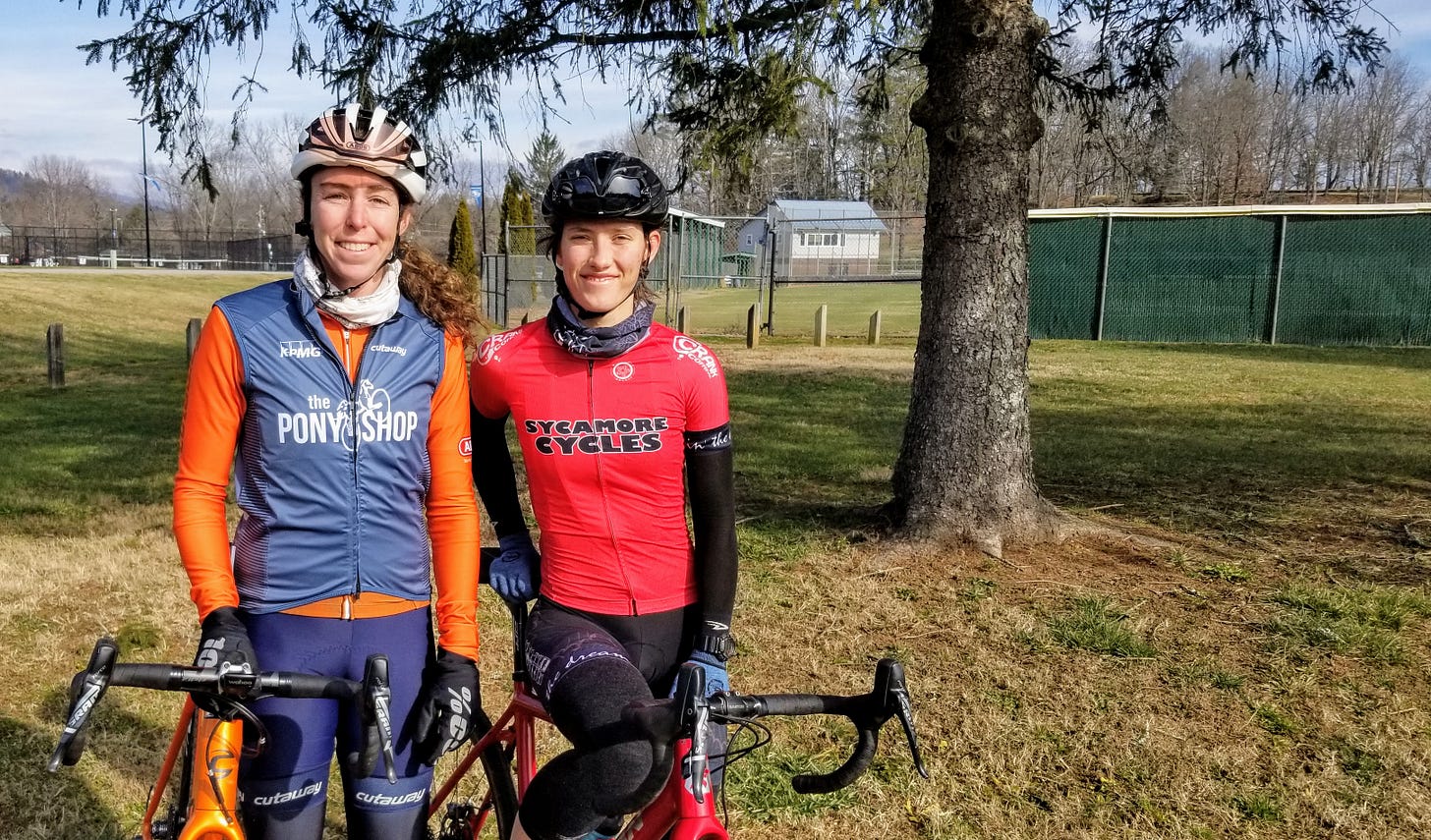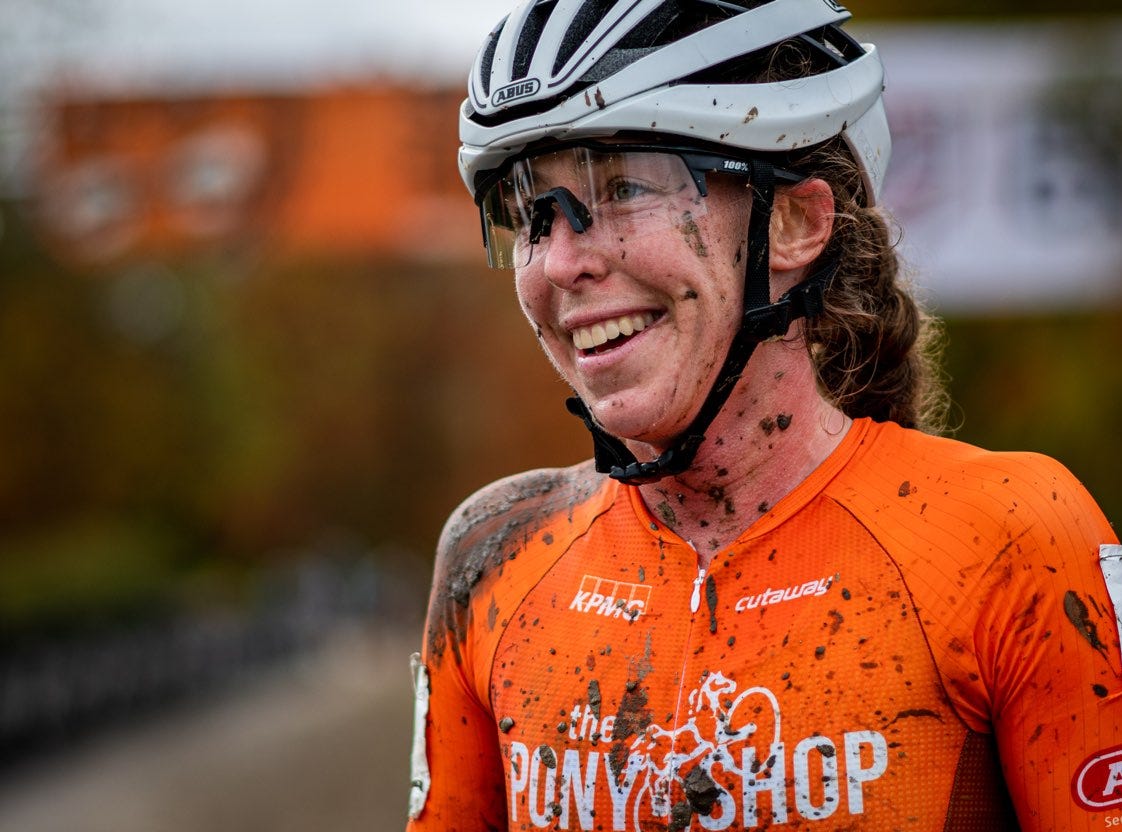Local Racers Going to Worlds? Great but No Biggie. It's Brevard.
Brevard College alums Hannah Arensman and Erica Zaveta will ride for the U.S. at the World Cyclo-cross Championships. They downplay the feat, saying they are just two among many strong local pros.
BREVARD — Hannah Arensman let on that she might have done something special only after 20 minutes of conversation and only when talking about another local cyclo-cross racer, Tristan Cowie.
“He went to worlds at the elite level a few years ago, which was a really big deal,” she said.
But, wait, isn’t that what you’re about to do?
“Yeah, yeah, yeah,” said Arensman, 23, before finally explaining what it meant for her and another local rider and Brevard College alum, Erica Zaveta, to make the United States national team at the upcoming Cyclo-Cross World Championships. They will be joined by a yet another Brevard graduate, Scott McGill, now based in Maryland, meaning three of the 14 U.S. riders in the elite field have ties to Brevard.
“Anytime anyone makes it to worlds it’s huge, and making it on the elite stage is that much more prestigious,” Arensman said. “I guess I can boldly say as a cyclo-cross fanatic, that, yeah, it’s the biggest race you can get into.”
So here is what was most noticeable when she and Zaveta got together for a workout at the college last week:
They look like they're ready to go up against the world’s best in the history-rich, off-road discipline of cyclo-cross, a sport distinguished by relatively brief, brutal races, stretches of running, and, typically, lots of mud.
They were obviously superfit. They rode top-end bikes and their jerseys were plastered with the names of sponsors.
But they didn’t necessarily sound the part.
Zaveta, 32, modestly called herself a “grandma in the sport,” and in a later interview had to be prodded into saying she won five national championships as a collegiate cyclist and has a long history of riding professionally. The only time she bragged was when the subject was Arensman’s fourth-place finish in December’s national cyclo-cross championships.
“Hannah crushed it,” she said.
Which you you’d never hear from Arensman. Convincing her to do even the basics of self-promotion — providing photos, lists of victories or, of course, talking herself up — is like pulling teeth.
Why not boast a little?
“Maybe it's just because we haven’t come to terms with it ourselves yet,” Arensman said. “We’re like, did we really get in? Okay. I think we did.”
Or “maybe,” she said, “it’s part of the racer’s mentality not to celebrate before the race.”
Also, there’s this: it’s Brevard.
“In a lot of ways it’s taken for granted because it’s become pretty common,” said Brevard College Head Cycling Coach Brad Perley. “We have a lot of riders from the area, those who went to Brevard College especially, who are making the jump to racing at the world championship level.”
A Community of Pros
The school, as is widely known, routinely bagged Division II national team titles from 2009 to 2014 and has continued to excel against “drastically, drastically” larger and better-financed programs since moving up to Division I in 2015, Perley said.
At the most recent national collegiate mountain bike championships, for example, three Brevard College riders took individual titles and the school placed third in the team competition. Three of the school’s racers have also qualified for cyclo-cross worlds in the under-23 category.
But less recognized is the community of young professional riders the program has helped spawn. A partial list of pros who either graduated from the school and/or help out with its cycling team includes Cowie, assistant coach Cypress Gorry, gravel racer and YouTube coaching star Dylan Johnson, as well as top downhill mountain bikers Neko Mulally and Luca Shaw, who is indirectly responsible for the presence of the biggest name off all.
His romantic partner is Swiss rider and part-time Transylvania resident Jolanda Neff, who won mountain biking gold at the 2021 Tokyo Olympics.
They come here, of course, for the famously scenic and challenging roads and trails. But all these pros wouldn’t stick around and thrive if not for the anchor provided by a cohesive team, Perley said. The team, in turn, wouldn’t be nearly as good without the examples and encouragement provided by its accomplished grads.
These riders tend to stay “very much in contract and very involved with the (college) team, and Erica and Hannah would be great examples of that,” he said.
“There are a lot of people making this machine work . . . There are a lot of factors in making it an environment where people really feel at home and can focus on progressing.”
The Long Road
Such an environment is helpful, even necessary, because the path to success in professional cycling is long, hard and generally not particularly lucrative.
Arensman joked about the “hundreds and hundreds of dollars” to be made in the sport and then said more seriously that most pros need other jobs to make ends meet.
She and Zaveta got similar starts, growing up in cycling families and immediately becoming hooked, Arensman in Valdese, N.C., east of Asheville, and Zaveta outside of Philadelphia.
Especially in the mid 2000s, when Zaveta got into serious cycling, it was a male-dominated sport, she said, “mostly dudes.”
With few races available for teenage girls still building bike-handling skills, organizers “ended up throwing me into masters’ races,” she said. “I’d be like 16 and crashing out 55-year-old guys. . . It was a really weird mix.”
Arensman, who ran her first triathlon at age 11, said she had at least one female role model, her older sister and “hero,” Allison, who also competed for Brevard College.
“I followed in Allison’s footsteps pretty much everywhere she went. She couldn’t get rid of me,” Hannah Arensman said. “Poor Allison.”
Both she and Zaveta attribute their success mostly to perseverance. But they also saw clear signs they possessed unusual talent.
Arensman’s early training included joining her sister and longtime personal coach Sonni Dyer on fast, competitive group rides. At the end of one of them, when she was about 14 years old, Arensman said, “I got the slingshot off Sonni’s wheel and actually ended up winning the sprint.”
“They were like, you might be all right at this,” she said. “And I was like, okay, cool.”
Zaveta didn’t really appreciate her own ability, she said, until she won her first national championship for Lees-McRae College, in Banner Elk, before transferring to Brevard. Though only 21, she said, she viewed it as the end of a long drought.
“I’d been racing for five years, and it felt like such a long time that I was never really at the top,” she said.
They both look back fondly on riding in college, where Arensman found a family-like team whose members “really sought to build each other up,” and Zaveta, after her experiences as a teen, basked in the plentiful and easily available racing opportunities.
“You basically just get in the van,” she said.
They both say they are more successful because of the strength of the local cycling community, which is especially crucial in disciplines, such as cyclo-cross, which put a premium on bike handling.
“Having other similar riders for skill sessions is irreplaceable,” Zaveta said.
Even more so, for Arensman, is her local employer and sponsor, Sycamore Cycles, whose support includes providing travel expenses and allowing her the time off needed to build the resume that qualified her for worlds.
But not long ago, neither of them expected to be there.
In 2019, after two years riding for a professional road team in Europe, Zaveta said, she stepped away from cycling to focus on her career with the Cycle-Smart coaching company and her part-time work in real estate.
“I thought I was done with racing,” she said.
But then came the Covid-19 pandemic, she said, when “my bike felt like the safest place to be.”
Riding led to racing and, earlier this winter, to racking up strong results on the European World Cup Cyclo-cross circuit. She now has a contract with a team specializing in short-course road races called criteriums and sponsored by the Colavita olive oil company.
“I got sucked back in,” she said. “The universe is not letting me go.”
Aerensman said that, because of Covid-related cancellations the previous year, she wasn’t sure how this fall and winter season would shake out.
“I wouldn’t have actually raced if not for the shop I work at,” she said; Sycamore owner Wes Dickson approached her before the season “and said ‘Hey, you want to race for the shop this year?’ And I was like, sure.”
Muddy and “Ridiculous” — but Beloved
Cyclo-cross is one off the more obscure cycling disciplines in the U.S., and Zaveta knows it might present a strange spectacle to people who don’t know much about it. It sometimes even looks that way to her, who loves it.
“It’s very ridiculous,” she said. “You’re out there running around in this stupid field, thinking, like, what are we doing out here?”
But its history dates back far before the advent of mountain biking, and in northern Europe, where the sport originated, it can attract crowds of more than 50,000, Dyer said. It’s a well-established training ground for road-riding legends and a pure test of cycling, “a blend of fitness and power and extremely technical skills,” he said —which makes it ideal for Arensman.
All the mountain bike racing she did in college honed her bike-handling skills, Dyer said. Her early love of triathlon turned out to be the perfect preparation for the sport’s running element.
“There’s a difference between fast running and strong running — running with a bike on your shoulder that’s covered with mud — and Hannah’s a very strong runner,” Dyer said.
Some riders are put off by the mud. For Arensman, it’s part of the appeal.
“When I started it, I could basically play around on my bike and nobody was going to say, ‘You need to be more serious,’ or ‘You can’t get your clothes dirty,’ ” she said. “It was like, no, you’re supposed to get your clothes dirty. I guess the kid in me says this is a lot of fun.”
“Hannah’s a unique one for sure, just for her grit attitude,” said Perley, though he was talking less about the stuff that accumulates on cyclo-cross bikes and more about Arensman’s capacity for brutal training sessions like the one last week.
Zaveta, having ridden hard the day before, peeled away after the warm up. Arensman set off on a grass loop near the college’s baseball field, riding for three minutes at race pace before throwing her bike on her shoulder and charging up a steep wooded slope.
After two minutes of recovery, she did it all again — four more times.
The idea was to replicate conditions at the championship race, scheduled for Jan. 29 in Fayetteville, Ark. Neither she nor Zaveta can hope to win, they said, partly because they will start far back in a field stacked with riders from the sport’s powerhouses, Belgium and the Netherlands.
Arensman just plans to ride to the very limits of her skill and fitness levels, to follow the advice of her original hero, she said.
“If I can, as my sister says, race like nobody else is on the course, I’ll be pleased with the result.”







Great article.
Thank you.